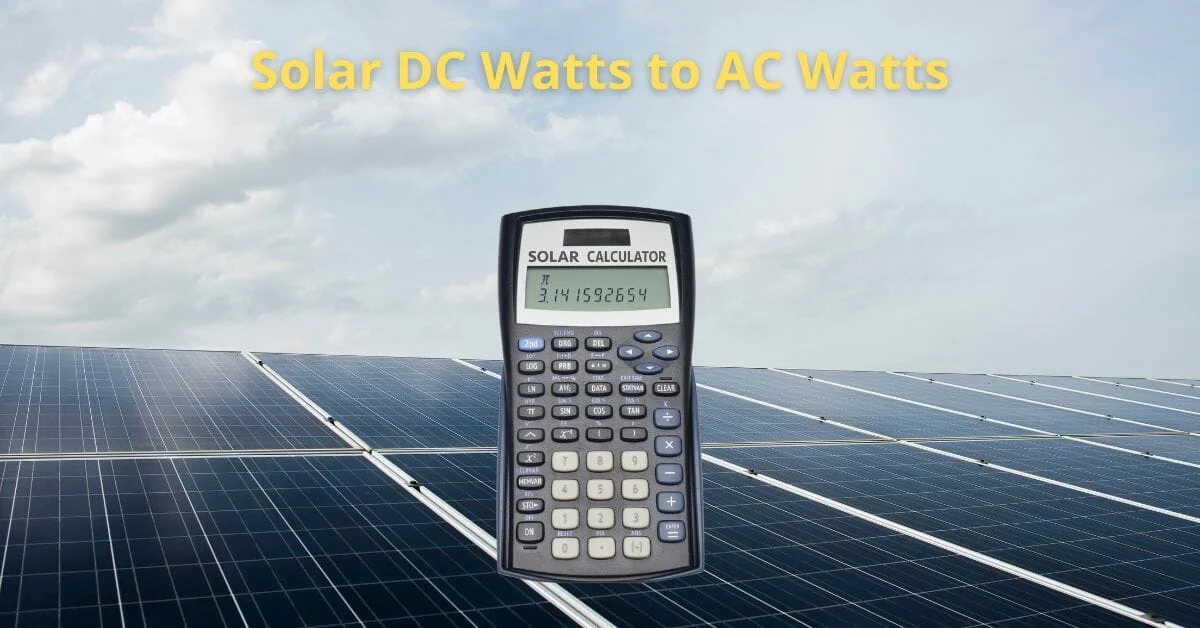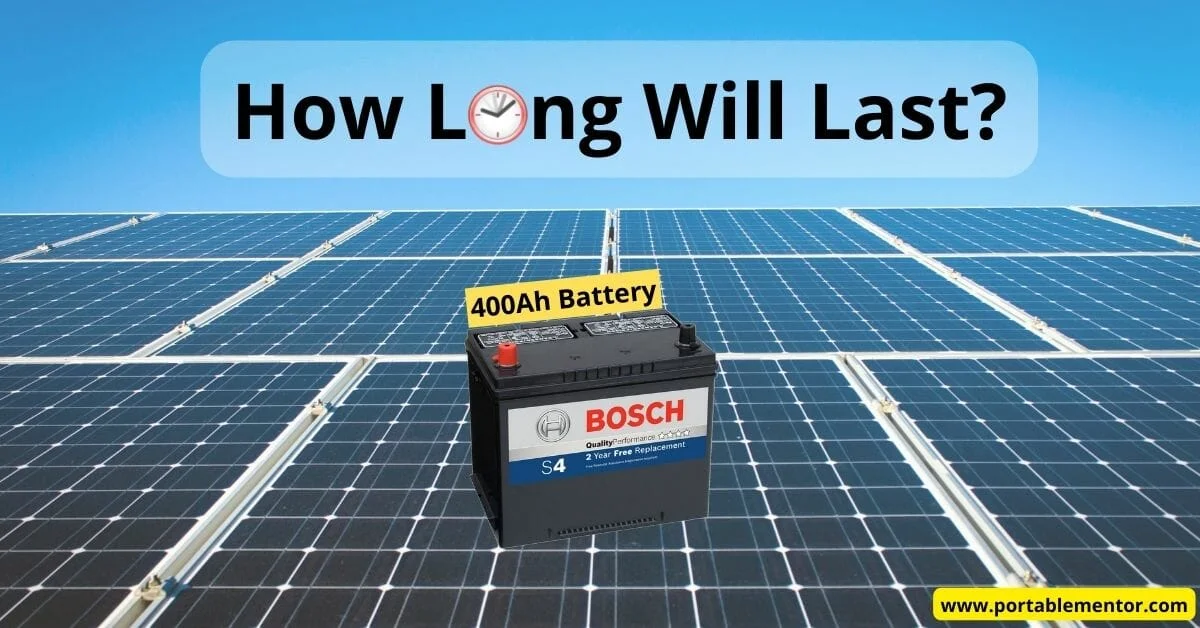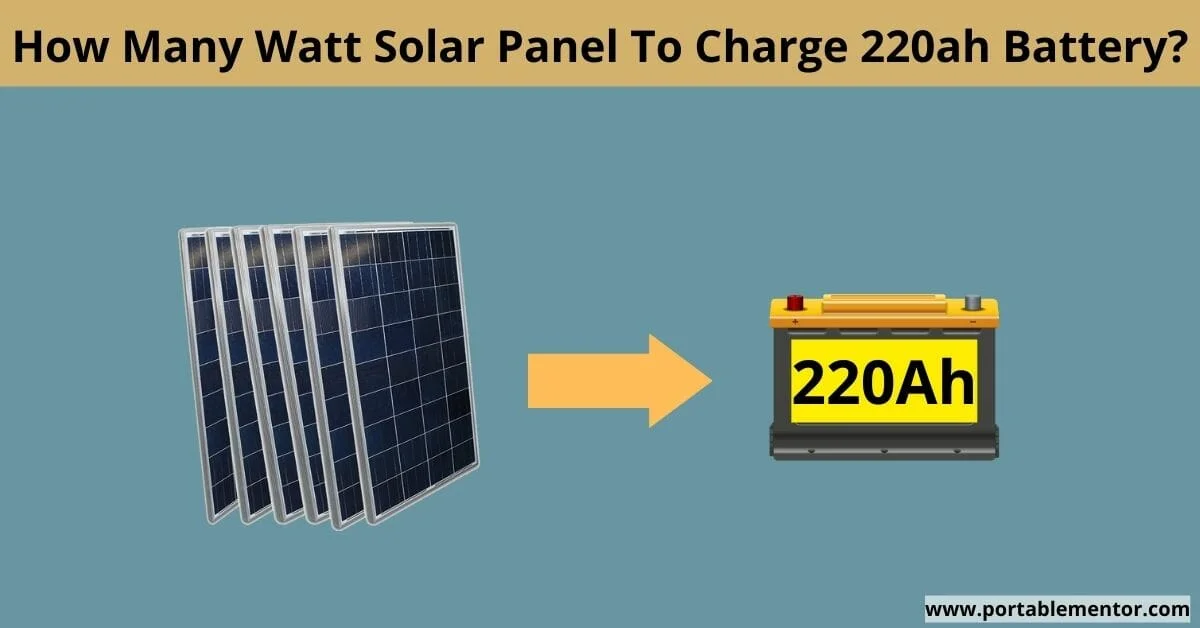In short, a 12v 400ah battery with a 50% DoD limit will last between 20 hours (running a 100-watt AC appliance) to 1 hour (running a 2000-watt AC appliance).
The backup time, or how long your 400Ah battery can run your appliances, depends on a few key factors:
- The type of battery you have
- The amount of power your appliances use
- How efficient your inverter is
- The life cycle of your battery
Now let's break down each part and see how it will affect the 400ah battery backup time. By the end of this post, you'll know how to work out the run time of any battery size.
how to calculate How Long Will a 400Ah Battery Last?
If you're in a rush and need to find out the backup time of your battery quickly --- you can use the following formula. Or even easier, you can use our "Battery Runtime Calculator".
Battery Runtime = (Battery Ah x Battery Volts x Discharge Efficiency x DoD Limit x SoC x Inverter Efficiency) ÷ Load
Let's break down each part of this formula for your explanation:
- Battery Ah is the total capacity of your battery, In this case, 400ah.
- Battery voltage will be the total voltage of your battery system. If you have 2 x 12v 200ah batteries connected together in parallel, the voltage will remain 12v and amps will add up (200 + 200 = 400ah). If you'd connect them in series, the voltage will be 24v and amp-hours will stay 200ah.
- Battery discharge efficiency of lead acid, AGM, and gel batteries is about 80-85% efficiency, meaning there will be a 15-20% power loss when discharging them. On the other hand, lithium batteries have a discharge efficiency of 90-95%.
- DoD limit refers to the depth of discharge limit of any battery. Lead acid, AGM, and gel batteries are designed to be discharged at 50% only. Meaning you can only use 200Ah from a 400ah lead acid battery. On the other hand --- lithium batteries can be discharged 100%.
- SoC refers to the state of charge of a battery. If the battery is fully charged --- put 1, and if it is half charged --- put 0.5.
- Inverter efficiency: Most inverters are about 90% efficient.
- To calculate the load --- add up the wattage capacity of all the appliances which you desire to run on a 400ah battery.
example
Let's say you want to know how long will 12v 400ah lithium battery run a 1500 watt space heater.
Battery Runtime = (400 x 12 x 0.9 x 1 x 1 x 0.9) ÷ 1500 = 2.5 hours
Turns out, a 12v 400ah lithium battery will run a space heater for about 2.5 hours.
What does 400Ah mean in Watts?
400Ah battery means it can supply 400 amps for one hour. Converting the ampere-hours (Ah) of your battery into watts will give you an idea of how much ACTUAL energy your battery can supply.
Formula: Ah x volts
12v 400Ah --- how many watts?
12v 400ah battery = 4800Wh
24v 400Ah --- how many watts?
24v 400ah battery = 9600Wh
36v 400Ah --- how many watts?
36v 400ah battery = 14,400Wh
48v 400Ah --- how many watts?
48v 400ah battery = 19,200Wh
As you can see, a 400ah battery can supply anywhere between 4800 to 19,200Wh energy depending on its voltage.
Impact Of Battery Type On Runtime
So, when we talk about the battery types, you’ve got the lead-acid, AGM (Absorbent Glass Mat), lithium (LiFePO4), and Gel batteries.
400ah Usable Capacity
Except for lithium batteries, other battery types should not be discharged below 50%, known as the depth of discharge limit (DoD). Which means you can only use 200ah from a 400ah lead acid battery.
Here’s a chart illustrating different battery types of 400ah batteries and their usable capacity in Ah, and watt-hours.
| 400Ah battery Type | DOD limit | Usable Ah | Usable watts |
|---|---|---|---|
| Lead-acid | 50% | 200Ah | 2400 watts |
| AGM | 50% | 200Ah | 2400 watts |
| Gel | 50% | 200Ah | 2400 watts |
| Lithium-ion | 100% | 400Ah | 4800 watts |
Battery Discharge Efficiency
When discharging different types of batteries, their discharge efficiency will be different.
Based on directscience.com data:
- Lead-acid batteries discharge efficiency ≈ 80 − 85%
- Lithium-ion batteries discharge efficiency ≈ 90 − 95%
is 400ah battery enough for you? --- load calculation method
This part needs more explanation. To accurately calculate the total load which you desire to run with a 400ah battery, follow these steps:
- List out all the appliances you want to run.
- Find out every appliance's wattage consumption. This will be mentioned on the back side of the appliance, on the user manual or either you can use an electricity wattage consumption monitor (click here to check the latest price).
- Multiply the desired running hours by the wattage consumption for each appliance.
- Lastly, add the total wattage consumption of all appliances (after running hours).
example:
- 3 x LED lights (20W) --- 5 running hours = 100Wh
- Charging laptop (65W) --- 4 running hours = 260Wh
- RV mini fridge (60W) --- for a whole night, 14 hours (4.5 duty hours) = 270Wh
- TV (60W) --- 4 running hours = 240Wh
100 + 260 + 270+ 240 = 870Wh
So you'd need a 36v 400ah battery system to run this much load for a whole night.
Output Load --- AC vs DC watts
Most appliances in our homes, like the fridge, ceiling fan, coffee maker, and washing machine, need around 220-240 volts to operate. That's because our home electrical systems are typically set up to supply this voltage.
However, our solar batteries usually supply a much lower voltage: 12, 24, or 48 volts. To bridge this gap and make our appliances work, we need something called an inverter.
Now here's a bit of a snag - inverters aren't 100% efficient, but I'll get to that shortly.
If you're using DC appliances, you can plug them straight into your battery. This means no power loss, so you get the most out of your battery. DC appliances include things like phone chargers, laptop chargers, LED lights, and bulbs.
In contrast, heavier appliances like fridges, ceiling fans, coffee makers, washing machines, and air conditioners require AC power. In a nutshell, they need a bit more oomph to run, which is provided by AC power.
Why does this matter, you ask? Well, if you're running AC appliances through an inverter, some power is lost in the conversion process, which can reduce the backup time of your battery.
Battery life cycle matter
With each charge and discharge cycle, your battery's capacity drops slightly. This might not seem significant, but after a few hundred cycles, it can make a big difference.
So, what's a battery cycle? It's when you charge your battery up to 100% and then drain it down to its recommended depth of discharge (DoD) limit.
And here's the kicker: different types of batteries have different life cycles. Here's a quick chart to illustrate this:
| Battery Type | No. of Life Cycles |
|---|---|
| Lead-acid | 500 |
| AGM | 500 |
| Lithium-ion | 2000 |
So after 500 cycles, a lead-acid battery will lose about 20% of its capacity. That means your 400Ah battery will now only be able to store 320 amp-hours.
So, while you might think your battery is fully charged, if it's been through many cycles, it's not going to hold as much power as it did when it was new.
This is crucial to remember, but it's a detail that often gets overlooked in many articles about batteries.
How long will a 400Ah battery last with an inverter?
Here's a chart illustrating how long will a 12v 400ah battery last with different size inverters.
| Inverter size (Watts) | How long will a 12v 400Ah lithium battery? |
|---|---|
| 500W | 8 hrs |
| 700W | 6 hrs |
| 1000W | 4 hrs |
| 1200W | 3.5 hrs |
| 1500W | 2.5 hrs |
| 2000W | 2 hrs |
Summary
- 400ah battery will last between 2 to 8 hours with an inverter. The exact value will depend on the size of your inverter.
How long will a 400 amp hour battery last --- examples
If you're wondering how long your 400Ah battery will last when running different appliances, here are a few examples:
| Appliance | Wattage Required | Run Time on 400Ah Battery (50% DoD Limit) | Run Time on 400Ah Battery (100% DoD Limit) |
|---|---|---|---|
| Fridge | 300 | 10 hours | 20 hours |
| Air Conditioner (AC) | 3500 | 35 minutes | 1.1 hours |
| Washing Machine | 800 | 2.5 hours | 5 hours |
| Coffee Maker | 1000 | 2 hours | 4 hours |
| Microwave | 1000 | 2 hours | 4 hours |
| Toaster | 850 | 2.4 hours | 4.8 hours |
| Space Heater | 1500 | 1.3 hours | 2.7 hours |
| Iron | 1200 | 1.7 hours | 3.4 hours |
| Electric Blanket | 200 | 10 hours | 20 hours |
These calculations are based on an inverter with an 85% efficiency rate. So, your run times could be a little different if your inverter's efficiency is higher or lower.
Just to clarify, "DoD" stands for "depth of discharge." A 50% DoD means you're only using half of the battery's capacity, while a 100% DoD means you're using the full capacity.
Disclaimer: All these numbers are based on if your battery is fully charged.



Hello, your content here is very helpful and clear.
Please can you share a formular you used in your battery run time calculator.
I wish to have it on an excel for easy accessibility.
Dear Tajudeen,
Thank you for your feedback. The formula to calculate the runtime of a battery is as follows:
Battery Runtime = (Battery Ah x Battery Volts x Discharge Efficiency x DoD Limit x SoC x Inverter Efficiency) ÷ Load
It’s important to note that discharge efficiency varies by battery type. For example, lead-acid batteries typically exhibit a discharge efficiency between 80-85%, while lithium-ion batteries are slightly more efficient, generally between 90-95%.
For a more in-depth exploration of this subject, I highly recommend referring to the battery runtime guide. It provides comprehensive coverage on this topic.
Best regards.
Thank you so much for the reply, I was actually more concerned whether or not calculations take into consideration the SOC of the battery which I can truly see in the formular you shared.
I will definitely take the discharge efficiency into consideration as you advised. And read through the battery run time guide. Thank you.
Best Regards.
Happy to help 🙂